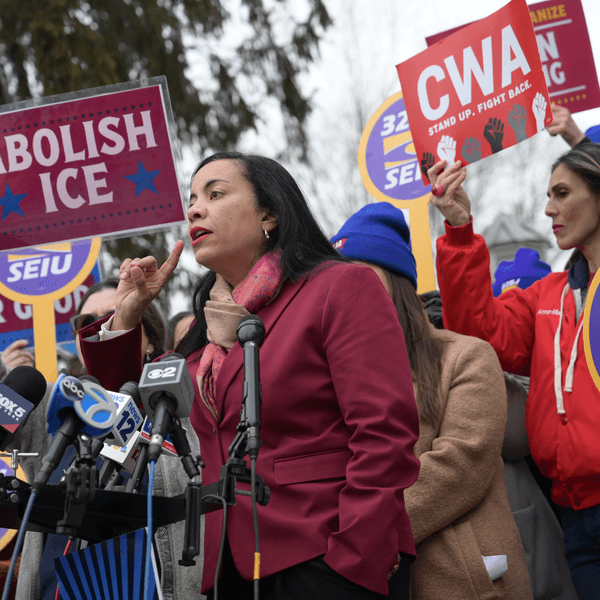Officials on Monday night declared socialist candidate Pedro Castillo the winner of last month's presidential election in Peru, following weeks of delays caused by far-right candidate Keiko Fujimori's baseless allegations of electoral fraud.
Castillo, the son of illiterate peasant farmers from a poor Andean region, defeated Fujimori, the daughter of jailed former Peruvian dictator Alberto Fujimori and symbol of the South American nation's wealthy elite, by a margin of more than 44,000 votes in the June 6th runoff election. But the official results were postponed for over a month due to appeals made by Fujimori's campaign.
"Fujimori accused Castillo's supporters of tampering with tally sheets across the country," the New York Times reported Tuesday. "But in the weeks that followed the vote, no one came forward to corroborate her central claim: that the identities of hundreds of poll workers had been stolen and their signatures falsified."
In "an action that would have disenfranchised many poor and Indigenous Peruvians," Fujimori attempted "to have about 200,000 votes tossed out in areas where Castillo won by a landslide," the Times noted.
On Monday, the country's National Electoral Court dismissed Fujimori's requests to invalidate ballots from impoverished rural areas. The court's rejection of Fujimori's effort to overturn the will of Peruvian voters solidified her third straight defeat at the polls.
With his supporters--hundreds of whom spent weeks camped out in front of the Electoral Tribunal in Lima while votes were being recounted--chanting "yes, we could," Castillo delivered a victory speech from a balcony in the nation's capital.
"I call for the broadest unity of the Peruvian people," said Castillo, a former rural educator and union leader who helped organize a nationwide teachers' strike in 2017. "Together we'll share this struggle and this effort to make a more just, dignified, and united Peru." Addressing Fujimori, the president-elect added: "Let's not add more obstacles to moving this country forward."
Shortly before election authorities made their official announcement, Fujimori "said in a televised speech Monday evening that she would acknowledge the results out of respect for the law, but called his pending proclamation as president-elect 'illegitimate' and insisted again that his party had stolen thousands of votes from her," the Times reported.
Last month, Castillo emphasized that "votes from the highest mountain and farthest corner of the country are worth the same as votes from San Isidro and Miraflores," referring to two affluent districts in Lima, the nation's capital city.
"No more making fun of workers, peasant leaders, or teachers," Castillo told a crowd of supporters. "Today we must teach the youth, the children, that we are all equal before the law."
During a celebration on Monday night, Danny Castillo, a supporter of the president-elect, told reporters from DW News that "change is coming."
Castillo's campaign slogan, "No more poor people in a rich country," resonated with millions of Peruvians, who say they voted for the former hotel cleaner and school teacher because he promised to reform the constitution and hike taxes on mining firms' profits. Peru is the world's second largest copper-producing nation, after Chile, and Castillo has vowed to reinvest revenue to improve social services, including health and education.
Supporters of Castillo hope that an agenda of downward redistribution and public provision can mitigate the worsening inequality they attribute to the neoliberal economic model implemented by ex-President Alberto Fujimori.
The consequences of austerity and other corporate-friendly policies have become impossible to ignore in Peru and around the globe during the coronavirus pandemic. Peru has the world's highest documented per-capita Covid-19 death toll, and nearly 10% of its population has been driven into poverty in the past year, according to the Times.
Castillo's five-year term begins on July 28, the 200th anniversary of Peru's triumph over Spanish colonialism.
"Let's end this bicentennial, which has had a lot of problems along the way, and open the door so the next bicentennial is full of hope, with a future and a vision for a country in which we all enjoy and eat from the bread of the country," Castillo told a crowd of supporters last month. "Let's take back Peru for Peruvians."




